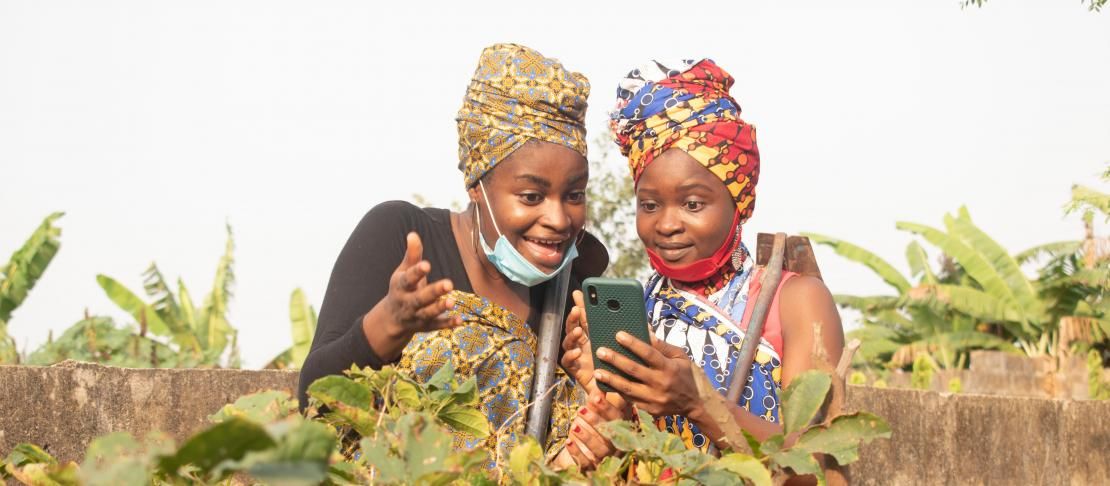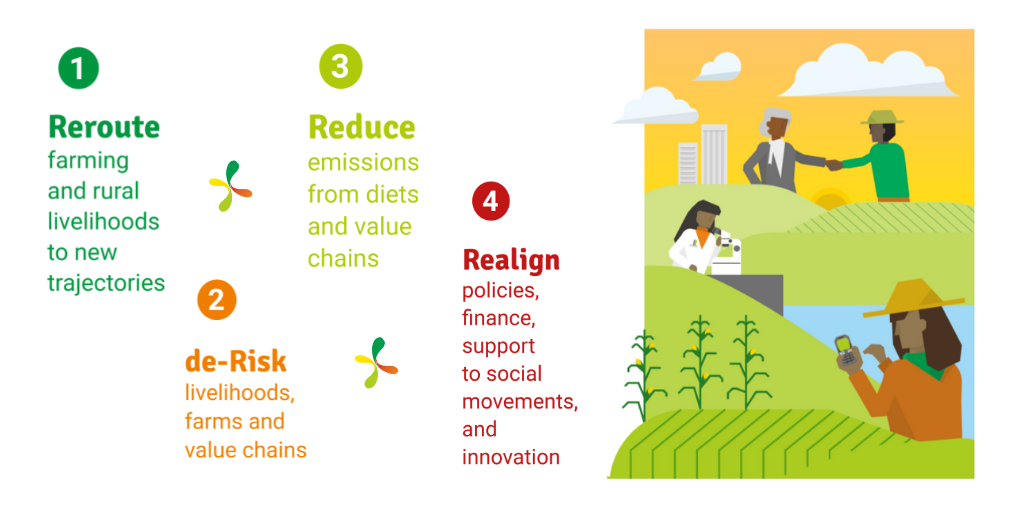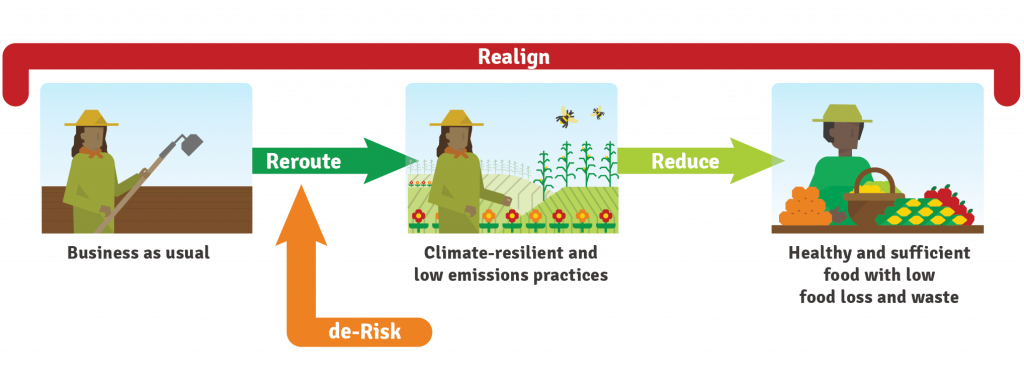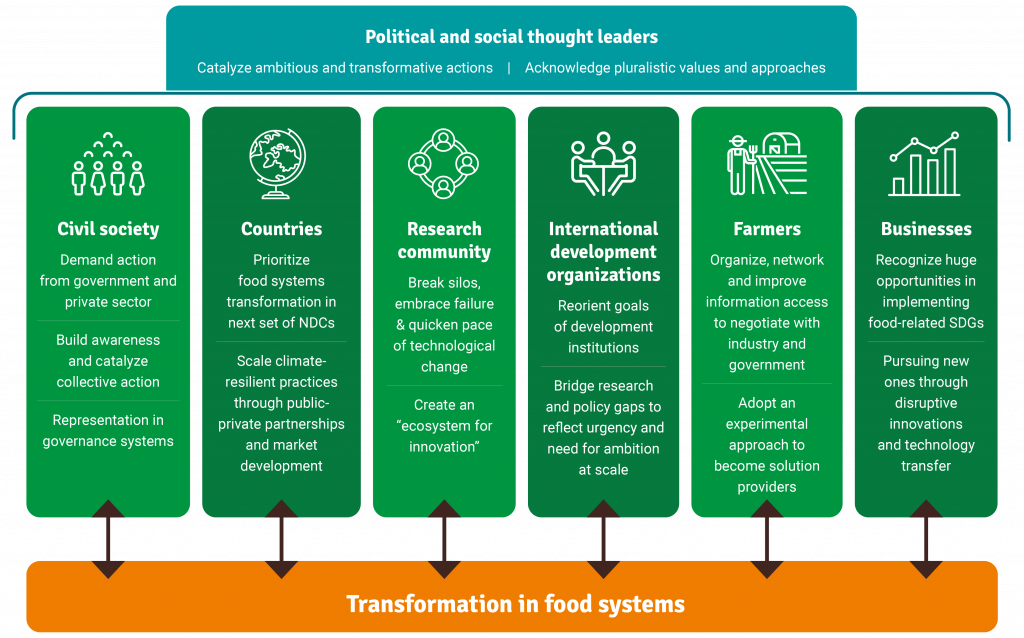One year down, nine to go. Can we transform food systems by 2030?

The 'Actions to Transform Food Systems Under a Changing Climate' report (or 'transformation report' for short) with its four actionable areas and 11 tangible action points, was developed out of a sense of urgency.
What's a transformation? An agricultural and food systems transformation is a significant redistribution—by at least a third—of land, labor and capital, and/or outputs and outcomes (e.g. types and amounts of production and consumption of good and service) within a timeframe of a decade.1 |
Launched one year ago today, the report outlined concrete steps for the 2020's that bring us a step closer to overcoming obstacles and achieving the UN Global Goals like: food and nutrition security; depleting natural resources; massive urbanization; an aging farming population; a need to rapidly reduce emissions from food systems and shifts in our diets.
One year on, and nearly 60,000 downloads* later, together with our 100+ partners we want to draw attention to our continued commitment to those actions, and relay our progress so far.
The global pandemic made 2020 transformative in its own right—altering how we work, socialize, and move around the world. Along with devastating health and human consequences, it disrupted production, consumption and value chains across the globe.
It laid bare our vulnerability to shocks—be it health or extreme climate events—while also demonstrating how swift and effective collective action can be taken at a time of global crisis. These realizations only highlight the need to transform food systems through these action areas:

Four targeted action areas for transforming food systems
Propelling forward in the ‘super year for climate ACTION’
Despite the challenges posed by COVID-19, we are happy to report that progress has been made across all action areas. While a comprehensive update can be read here, we wish to celebrate some of the milestones made one year into this decade of transformative agri-food systems change.
And, since 2021 has been dubbed the ‘super year for climate action’ given the number of UN high-level events taking place: Climate Adaptation Summit (CAS21) this past January; Food Systems Summit (UNFSS) in September; and the 26th UN Climate Change Conference (COP26) in November, we could not ask for better timing.
After all, any attempt to reach a ‘net-zero world’ has to address how we grow, process, package, transport, eat and dispose of food. As the below will demonstrate, we are strategically participating in these events, and the global attention they garner, to amplify and progress our action areas.
 Together the four actions actions catalyze transformation
Together the four actions actions catalyze transformation
- Rerouting: Together with the World Economic Forum and other key partners, CCAFS is building a platform to catalyze knowledge and technology to reach 100 million farmers and help them transition towards net-zero. By doing so, we empower consumers to make nature- and climate-friendly choices along the way. The 100 Million Farmers platform has three objectives: (1) Significantly reduce emissions and the degradation of nature caused by food systems, shifting towards more climate mitigation, adaptation and the restoration of nature; (2) Incentivize farmers to adopt regenerative climate smart agricultural (CSA) practices and encouraging greater buy-in from consumers; and (3) Facilitate collective commitments on net-zero targets that deliver for people, nature and climate by 2030. Our agenda is focused on actions and revolve around ‘lighthouse’ projects, which are led by a regional multi-stakeholder coalitions that design solutions tailored to local food systems and the biodiversity they depend on.
- De-Risking: The CCAFS-affiliated International Research Institute for Climate and Society (IRI) at Columbia University worked alongside a coalition of organizations like the Global Commission on Adaptation, World Resources Institute and World Business Council on Sustainable Development on the Investment Blueprint on Digital Climate Advisory Services (DCAS) report to improve climate resilience for 300 million smallholder producers. DCAS, which range from digital mobile apps, radio and online platforms to digitally-enabled printed bulletins with climate models, extension services and other platforms remain limited and fragment for smallholders. The first report outlining steps to tackle existing hurdles will be launched in summer 2021.
- Reducing: Together with Impossible Foods, the International Institute for Applied Systems Analysis (IIASA) and Limestone Analytics, CCAFS is investigating plant-based meat options in low- and middle-income countries. Research includes their potential impact on food security, land use, the climate, and biodiversity, and will include business cases for producing plant-based meat in four countries. The results are expected by August 2021 and will be publicly shared at the UNFSS.
- Realigning – Youth & social movements: CCAFS is supporting the Global Alliance for Improved Nutrition (GAIN), which aims to deliver a youth-led plan for ten years of action that is projected to mobilize millions of young people by 2030. Alongside this campaign, CCAFS hosted a workshop at the Youth for Climate Adaptation conference and participated in the International Conference for Youth in Agriculture (ICYA) conference. Looking forward the remainder of the year, CCAFS and partners is organizing the #Act4Food in the lead up to UNFSS 2021 and beyond. Additionally, we are organizing a side-event on Driving Global Youth Action for Climate Adaptation in Food Systems at the Pre-COP26 with partners.
- Realigning – Scaling innovation & impact Along with CCAFS’ involvement in the Innovation Lever of the UNFSS, as part of the UK’s Nature campaign for COP26, CCAFS and the UK’s Foreign, Commonwealth and Development Office's (FCDO) have launched the Transforming Agricultural Innovation for People, Nature and Climate campaign to deliver impact at scale. This work aims to mobilize and realign investment in agriculture R&D with climate-resilient food systems; develop innovative and inclusive solutions that meet demands; build evidence on what works by sharing knowledge about business models and partnerships that deliver; and foster partnerships between national and international partners to bring technology to scale. Ready to join the other climate champions in pledging your support? Sign here.
Enabling systematic transformation
Global food systems, when taken as whole, contribute a quarter of all global greenhouse gas emissions. Inaction is not an option. Furthermore, incremental and siloed changes will be not enough. That is why we are working in partnerships with government agencies, CGIAR partners, the private sector, academic partners, youth and many more to enact a systemic transformation of food systems.

The big picture for end-to-end transformation
And while the busy 2021 climate agenda will undoubtedly galvanize support for achieving sustainable, inclusive, healthy and climate-resilient food systems, the work has just begun. True transformation require sustained effort and coordinated action across the nine harvests left to save our climate.
CCAFS' Dhanush Dinesh explores some of the key partnerships that are helping to deliver on the ambition of the landmark CCAFS-led report - 'Actions to Transform Food Systems Under a Changing Climate' - launched one year ago. We also hear from CCAFS' Ana Maria Loboguerrero, Ruben Echeverría from the Commission on Sustainable Agriculture Intensification (CoSAI) and Ishmael Sunga, Chief Executive Officer of the Southern African Confederation of Agricultural Unions (SACAU), on the impact of the report on the global dialogue around food systems transformation.




